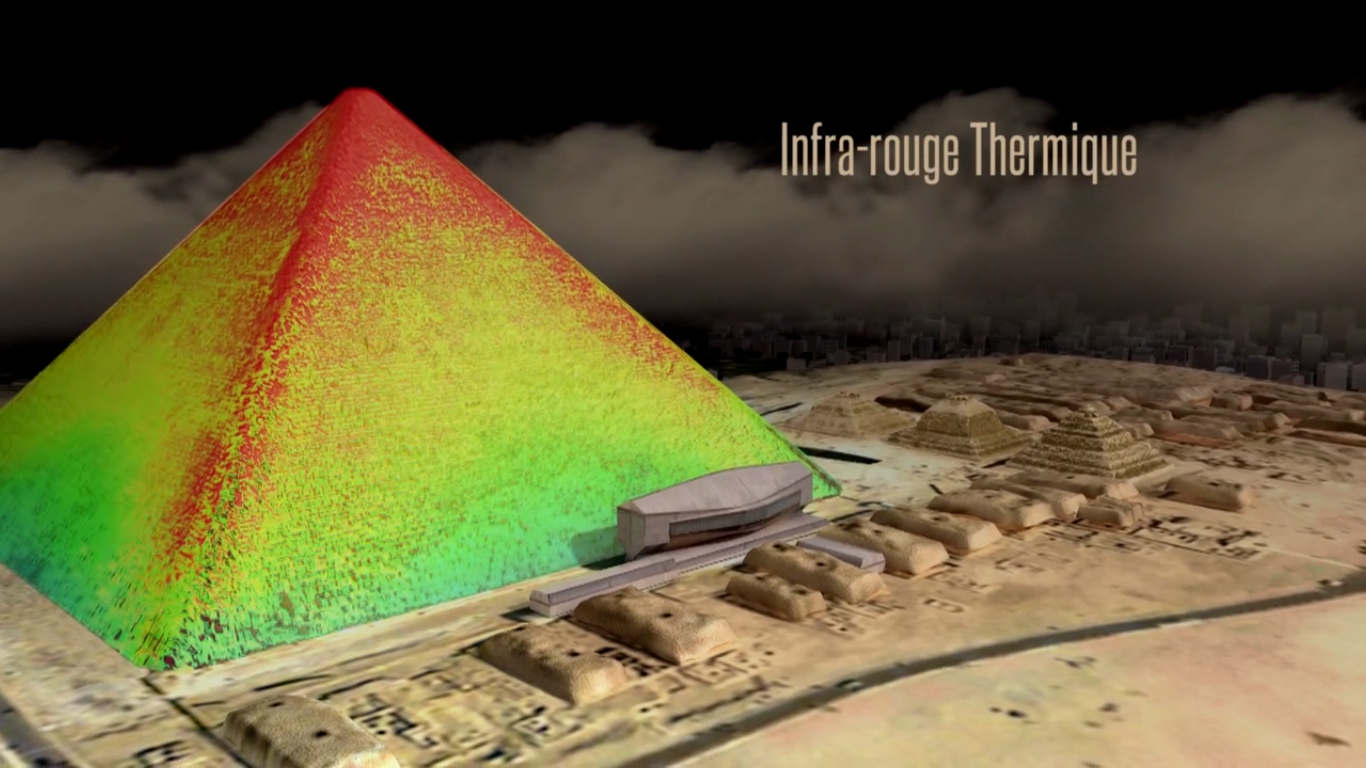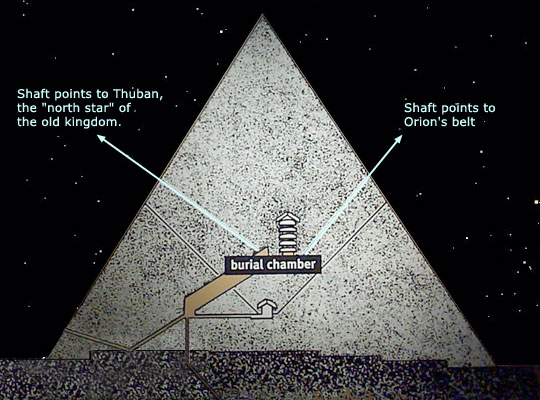Are Pyramids Proof Of An Ancient Advanced Civilization?
/
In our modern era, it cannot be denied that the ancient pyramids of Giza have somewhat become the “apple of mankind’s eyes." This is not just because we revel at their distinctiveness as a tourist destination, but mainly because these ancient structures are vestiges of a once-thriving civilization that had a unique history and culture.
Background:
The oldest and the largest of the Egyptian pyramids found at the vast desert landscape of Giza is the Great Pyramid. Believed to have been built for and by the will of the Pharaoh Khufu at some point during his reign in the 26th century BC, the Great Pyramid withstood the test of time. It was one of the biggest buildings on the face of the earth up until the transition to the twentieth century. Standing today at 455 feet (138 meters), this ancient structure is considered by some to be a unique icon of Egyptian legacy and is also the “last construction standing” among the listed Seven Wonders of the Ancient World.
The second pyramid, known as Khafre's pyramid, is widely believed to have been commissioned by Khufu’s son Khafre, whose reign commenced around 2520 BC. The Great Sphinx monument is also located near the Khafre’s pyramid and dates around the same time as his reign, which has led some scholars to believe that the human face of the Sphinx is that of Khafre himself.
The third pyramid, which is the smallest out of the three principal pyramids of Giza, was supposedly built to serve as the final resting place of Pharaoh Menkaure. It is believed to have been constructed between 2510 and 2490 BC during his rule.
Proof of Advanced Ancient Technology:
The pyramid complex of Giza is regarded by many to be an impressive feat of engineering, considering mankind’s knowledge about construction and the technology available to the builders of the time were supposedly primitive. Scholars also deem these pyramids as testimonial relics of the “blood, sweat and tears” of tens of thousands of laborers who worked for decades to erect these ancient structures.
These ancient buildings have continued to stand their ground for the past 4,500 hundred years, an incomparable achievement that has gained the interest and admiration of many. Part of the fascination over these pyramids is rooted in the curiosity over who built them as well as why and how they were built. These questions have opened an avenue of “new-age” discourse in our modern era, with some going so far as to assert that the ancient pyramids of Egypt could be a remnant of a technologically-advanced ancient civilization. Some even believe the pyramids are proof that ancient visitors of extraterrestrial origin once socially interacted with the people of earth.
Most talk of advanced ancient civilizations and ancient astronauts is put off as pseudoscientific or fantastical speculation, but those who believe that the pyramids of Giza could have been built using advanced ancient technology have arguments that are just too compelling to ignore.
Here are ten reasons why the pyramids of Giza could be evidence that Egypt’s ancient civilization once possessed advanced technology, which could be alien in origin.
1. The Size & Weight of the Pyramids & Their Materials.
One of the arguments raised by those who believe that the pyramids of Giza were built using advanced alien technology is the colossal size and weight of the pyramids and the materials they were built from.
Building the Great Pyramid, for example, required the quarrying and transportation of 2.3 million stone blocks. Lifting each of these blocks was not exactly effortless either as these stones weighed between 2.5 to 15 tons.
Archaeologists and researchers have presented theories of how the laborers of that time managed to quarry and transport these blocks from a nearby source to the site where the pyramid was built. However, many insist that these massive stones were nearly impossible to mine, move and lift given the primitive tools of that era. Since the Great Pyramid took at estimated 20 years to complete, it would have taken the laborers only two and half minutes to set each of the pyramid’s insanely-heavy blocks.
2. The White Limestone Casings of the Great Pyramid.
While the Great Pyramid is still a magnificent sight to behold, its current appearance today is nothing but a shadow of its former shining beauty. In the distant past, Egyptians referred to the Great Pyramid as “Ikhet,” which, which translates to “Glorious Light.” The Great Pyramid was once shielded with casings made of white-colored and smooth limestone until a disastrous earthquake in 1303 AD led to its untimely uncoupling. Much like mirrors, the pyramid stones reflected sunlight, which made the pyramid glisten like a crystal in the middle of the desert.
What’s interesting about these reflective stone casings is not just their shape and appearance, but also the source of the material they were made of. Gathering large amounts of flat and polished limestone meant that tons of these stones had to cross the long stretch of the Nile river before they could be used. For some, this leads to the inevitable question of how those who worked in the construction of the pyramid managed to transport heavy and reflective limestone without the guidance of sophisticated knowledge and machinery.
3. The Elaborate Tunnel Systems Inside the Pyramids of Giza.
Archaeologists uncover a secret or two hiding beneath the pyramids of Giza from time to time. Prime examples of these discoveries are the elaborate networks of tunnels hidden under the vast desert. There are those who have dared to explore these passageways and the potential rooms or compartments hidden within, but most are still largely unexplored by people of the 21st century.
What purpose could these tunnels have possibly served? Until we have the chance to excavate and thoroughly investigate these pathways, there’s still no definite answer to this question. Some believe that there could be an underground city beneath the pyramids of Giza and that this buried metropolis could be thousands of years old.
4. Strange Heat Anomalies in Several Areas of the Great Pyramid.
In 2015, an international team of scientists and architects conducted thermal scans of the pyramids in Giza. To their astonishment, they observed “thermal anomalies” in the pyramids and detected high-temperature heat spots in several areas of the Great Pyramid. Mainstream science proposed that empty chambers, internal air currents and the use of varied construction materials were the causes of these anomalies, but believers of ancient advanced civilizations had something completely different in mind.
They believe that the heat spots come from advanced ancient equipment or machinery hidden beneath the pyramids. Some even speculate that the Great Pyramid of Giza could be an antiquated spacecraft built or brought here on the planet by extraterrestrial beings and that the heat anomalies indicate that the alien ship’s engines are ready to ignite after receiving sufficient energy from the sun for the past few thousand years.
5. Alignment of the Great Pyramid with True North.
The position of the Great Pyramid and its alignment with the location of true north is one of the more well-known pieces of evidence for the possibility of a technologically-superior ancient civilization. Although built thousands of years ago, the Great Pyramid is regarded by many to be the most accurately-aligned structure on the planet – yes, even more so than our modern-day Meridian Building in London – with a very minimal degree of error of 3/60th. Moreover, this error is not just a mistake in calculation but is explained by the fact that true north shifts as time passes. This means that the Great Pyramid was perfectly aligned at the time it was built.
How did the ancient Egyptians manage to design and erect the Great Pyramid with such a high level of accuracy? They did not have a compass, so they must have calculated the alignment using sophisticated algorithms. But if they didn’t even have the knowledge and technology to make a compass, how could they have mathematically extrapolated the Great Pyramid’s near-perfect alignment with the cardinal direction of true north? Theories have attempted to answer this mystery, but experts can’t seem to agree on a single explanation.
5. Alignment of the Pyramids with the Stars of Orion’s Belt.
According to the Orion Correlation Theory, which was first presented by Robert Bauval back in 1983, the placement of the three main pyramids in the Giza Plateau aligns with the three main stars of Orion’s Belt. This theory also alleges that the whole outline of the Great Sphinx, the pyramid complex in Giza as well as the Nile River reflects the location of the constellations of Leo, Orion’s Belt and the Milky Way galaxy, in that order.
What’s interesting about this theory is its suggestion that the three pyramids of Giza were precisely aligned with the three stars of the Orion’s Belt in 10,500 BC. If true, this would mean that these pyramids were constructed 12,000 years ago and not 4,500 years in the past as mainstream science has led us to believe.
7. Eight-Sided Design of the Great Pyramid
While it may initially seem like the Great Pyramid of Giza has four sides just like most pyramids, it is the only one to have been built with eight sides and four slightly-concave faces.
Also worth mentioning is the degree of precision required in forming all eight sides of the pyramid, with each side indented by one degree of a half-degree, which is not an easy thing to do even in modern times.
Moreover, all sides of the Great Pyramid cannot be easily seen from the ground or even from afar, and are only visible from above.
As for what purpose the eight-sided design of the Great Pyramid served, some say that it had the structural purpose of keeping the casing stones from loosening, while others suggest that the indentations are nothing more than the incidental consequence of erosion. Of course, there are also those who believe that multiple-sided pyramid served an astronomical purpose or that it could be a communication device between ancient Egyptians and the extraterrestrial beings that guided them in the distant past.
Based on the seven reasons we have just enumerated, can we conclude that the pyramids in Giza prove that ancient Egyptians once possessed highly advanced technology that may very well have come from extraterrestrial sources?
Were our ancestors far more capable than we give them credit for? We may never know.
Sources:
https://en.wikipedia.org/wiki/Seven_Wonders_of_the_Ancient_World
https://en.wikipedia.org/wiki/Great_Pyramid_of_Giza
https://en.wikipedia.org/wiki/Giza_pyramid_complex#Khafre.27s_pyramid_complex
http://harvardmagazine.com/2003/07/who-built-the-pyramids-html
http://listverse.com/2017/06/02/the-pyramids-of-giza-prove-advanced-ancient-technology/
https://exemplore.com/ufos-aliens/Did-Aliens-Build-Pyramids
http://www.express.co.uk/news/weird/793767/Pyramids-Giza-how-when-built-ancient-aliens
http://proofofalien.com/top-10-evidences-to-prove-the-aliens-built-the-pyramids/
https://www.ancient-code.com/there-is-an-incredible-lost-underground-city-beneath-the-pyramids-of-giza/
http://www.bbc.com/news/world-middle-east-34773856
http://www.express.co.uk/news/weird/793767/Pyramids-Giza-how-when-built-ancient-aliens
http://proofofalien.com/top-10-evidences-to-prove-the-aliens-built-the-pyramids/
https://www.dailykos.com/story/2013/9/29/1242266/-Ancient-Egypt-Misconceptions-About-the-Pyramids
https://en.wikipedia.org/wiki/Orion_correlation_theory
http://unexplained.co/paranormal-articles/facts-that-prove-the-great-pyramid-of-giza-was-built-by-an-advanced-ancient-civilization/9523/
https://ancientexplorers.com/blogs/news/the-pyramid-of-giza-built-by-an-extremely-advanced-ancient-civilization
https://www.ancient-code.com/evidence-of-ancient-advanced-technology-the-great-pyramid-of-giza/















